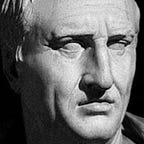The Thing with Many Properties (PS §§111–131)
At age 28, I found myself with a problem that was neither unrelated to nor totally exhausted by compulsive drinking and daily pot smoking. True, these latter led me to compulsively fantasize at my job as a nervous newspaper reporter about the hour when I could finally return home to my tiny studio apartment and “relax” with some beers and a joint, only to find that these things did not relax me at all, but instead made me more nervous and left me metaphorically clinging to the ceiling of my apartment like a cartoon cat.
But more than that: I had come to a stage in my life — for the first, but not the last time — where I had lost my center. That is something we say. That we have “lost our center.” That we need “to get centered.” In the chapter of the Phenomenology of Spirit on perception, Hegel provides a dramatic account of perceptual consciousness’s drive to be centered, to find a center in the object of its perception — or, failing that, in itself — and the misadventures it runs into.
I use a word as twee as “misadventures” here deliberately, since there is a note of screwball comedy in what happens to perception. It just can’t get it together. Having emerged from sense-certainty with consciousness of simple universals, perception sees them everywhere but can’t quite make them work. Why? Well because they appear together — an object might be round and red — but, because they are not internally related, they keep flying apart, so perception tries a few futile solutions.
Hegel’s discussion is complicated, but the most vivid solution perception attempts is the distinction between primary and secondary qualities. Perception believes that the object is One — it has to be to exclude some things and hold others together — but then it presents so many properties that it is difficult to reconcile these properties with the One, particularly when some of these properties aren’t stable themselves, since what is hot or cold or even red can be affected by the state of the perceiver. So the perceiver tries to take the difference on itself. The One is fine, it’s me that brings all the uncertainty and division, or — alternately — the subject imagines that the object is, in fact, nothing but a collocation of properties that are synthesized into an object by its own effort.
Perception is like the man trying to pick up five basketballs. Every time it picks up the fifth, it drops one of the other four.
I found myself in a similar situation. Having spent nine continuous years learning everything it was possible to believe, I found that I believed nothing. Faced with a question — even a simple question, like “is daily pot smoking maybe not making you happy?” — I would be able to generate a Kantian answer or a Nietzschean one, but no answer for myself. Whereas Hegel’s thing has properties, I had intellectual “moves,” and when I would sit, stoned, watching infomercials (imagining, of course, that I was doing cultural anthropology), I would cycle through the moves like so many Instagram filters (to allow myself a retro-analogy).
It would occur to me occasionally that I must be something else than this ability to catalog and apply moves, something other than my properties, but I shuddered to think what it might be. It was too scary to contemplate, giving up my moves, and the thought would be my cue to change the channel and load another bowl.
Originally published at milesglorios.us on May 10, 2017.
